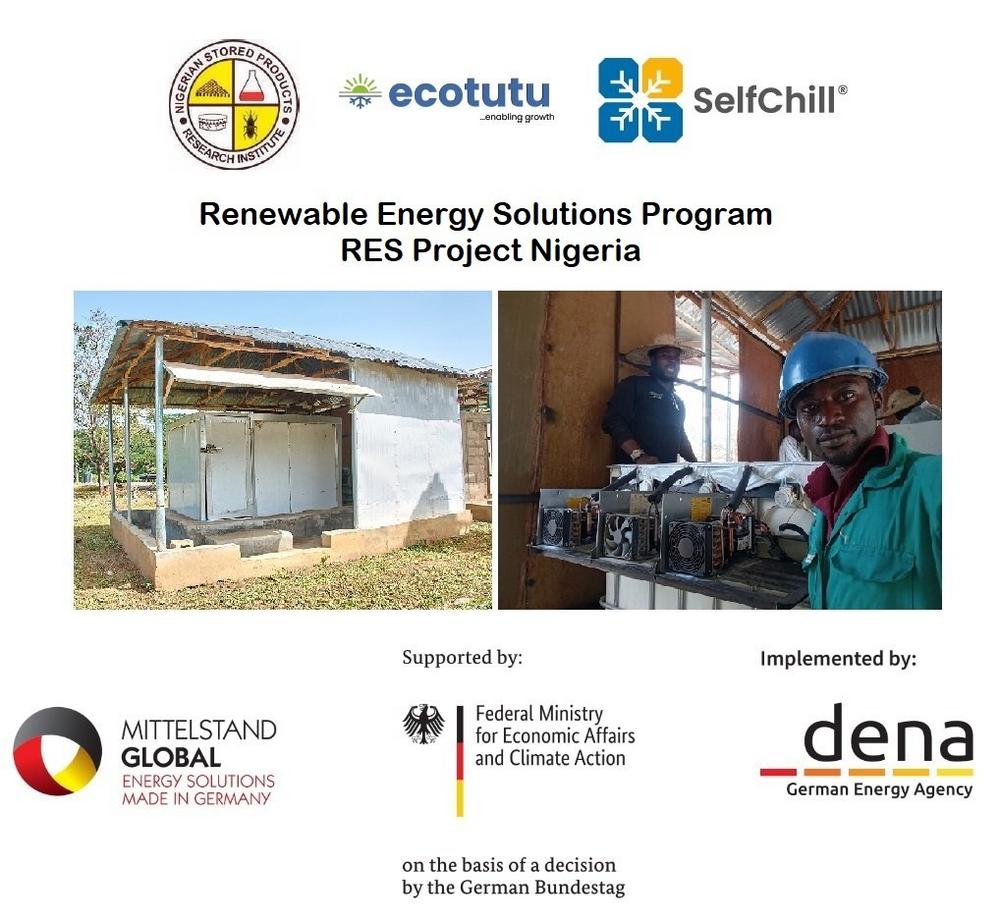SelfChill in Nigeria Background
Nigeria’s first SelfChill Cold Room was installed at the Nigerian Stored Products Research Institute (NSPRI) in Ilorin in December 2021. This state-of-the-art facility is currently being used for innovative research, and its multifaceted potential extends to training and education, marking an essential milestone in the deployment of the SelfChill technology in the country.
In February 2022, a second SelfChill Cold Room was installed in Benin City and in May 2023, a third Cold Room was installed in Lagos at the 12 Mile marketplace. Both systems were installed in collaboration with the company Ecotutu. The cold room at the marketplace serves as the heartbeat of a bustling market, preserving precious agricultural produce. The promotion of the technology was carried out under the RES project via a SelfChill’s partnership with Ecotutu to demonstrate the cooling units’ efficient operation and show potential customers the modularity of the SelfChill approach. The RES Project Nigeria is supported by the German Federal Ministry for Economic Affairs and Climate Action as part of the Renewable Energy Solutions Programme of the German Energy Solutions Initiative.
Empowering Solar-Powered Solutions
The RES project Nigeria supported different activities aimed at increasing the demand for solar-powered cold rooms in Nigeria, which included facilitating knowledge transfer regarding solar-powered cooling systems, specifically focusing on Nigeria’s agricultural sector by supporting training and the creation of marketing material. This initiative goes beyond education; it advocates for the local manufacturing of SelfChill solutions, promoting self-reliance in renewable energy technologies in Nigeria. The RES-Project Nigeria received support from the German Federal Ministry for Economic Affairs and Climate Action under the Renewable-Energy-Solutions Programme of the German Energy Solutions Initiative.
Webinar Series and On-site Training
The SelfChill knowledge transfer journey within the context of the RES project began with a series of three enlightening webinars in January, April and July 2023. These webinar series served as the foundation to disseminate know-how knowledge on solar-powered cooling system solutions for audiences in the public and private sectors. Around 40 participants, mostly from Nigeria, attended the three sessions.
Later, an on-site training was held in September 2023 at NSPRI Headquarters in Ilorin for knowledge transfer and local capacity building. An intensive training session was designed by the SelfChill team to provide technicians and engineers with the skills to design and install solar cooling systems. The on-site training session was provided by Dr. Omodara (NSPRI), who emphasized the pivotal role of cooling in post-harvest management. Engr. Adebiyi (NSPRI) provided valuable insights into ongoing research surrounding the SelfChill cold room installation in Ilorin. Afterward, Dr. Torres Toledo (SelfChill team) guided participants through sizing solar-powered cold storage solutions. Lastly, Dr. Salvatierra Rojas (SelfChill team) connected technology with quality, highlighting SelfChill’s holistic approach. This includes a detailed examination of the business model to ensure financial viability for the long-term sustainability of these innovative solutions.
The event was remarkable, attracting enthusiastic public and private sector participants. 30 professionals emerged from the training, now equipped with the knowledge and skills to harness solar energy for the cold storage of different agricultural produce.
Why are the SelfChill solar modular cold rooms so special?
The SelfChill Cold Rooms represent a remarkable milestone in addressing post-harvest losses that have negatively affected Nigeria’s agricultural sector. These solar-powered cooling systems have been methodically designed for various agricultural value chains, offering the optimal storage conditions needed to preserve perishable goods such as fruits, herbs and vegetables by maintaining the required temperature and relative humidity. Originally developed by German companies, this innovative technology has been adapted to Nigeria’s unique context by the NSPRI and Ecotutu. These strategic partners have played a pivotal role in making this technology both affordable and accessible in Nigeria while specifically focusing on meeting the storage needs of the country’s agricultural sector.
Empowering Nigeria’s Future
SelfChill’s journey in Nigeria exemplifies its commitment to sustainable agriculture and energy efficiency. Solar-powered cold rooms harness abundant solar resources, reduce post-harvest losses, and elevate the quality of stored produce. This initiative holds the potential to boost food security, stimulate economic growth, and reduce the carbon footprint. SelfChill’s dedication to transforming agriculture through solar-powered cold rooms is making a huge impact. Supported by the RES project Nigeria and therefore the German Federal Ministry of Economic Affair and Climate Action, Nigeria is positioned to lead the way into the adoption of solar energy for cold storage, securing a brighter, more sustainable future for its agricultural sector and beyond.
Phaesun GmbH, based in Memmingen, Germany, has specialized in sales, customer service and installation of off-grid photovoltaic and wind power systems since the company was founded in 2001. As one of the world’s leading system integrators of off-grid supply systems, Phaesun offers products from all renowned manufacturers in this industry. International project management, goal-oriented customer training and technical support complete the comprehensive service offering. Phaesun, with a branch office in France, can rely on a worldwide partner and sales network.
Phaesun GmbH
Brühlweg 9
87700 Memmingen
Telefon: +49 (8331) 99042-0
Telefax: +49 (8331) 99042-12
http://www.phaesun.com
Projektmanagerin
Telefon: 0833199042151
E-Mail: geraldine.quelle@phaesun.com
Projektmanager
E-Mail: info@solar-cooling-engineering.com
![]()
